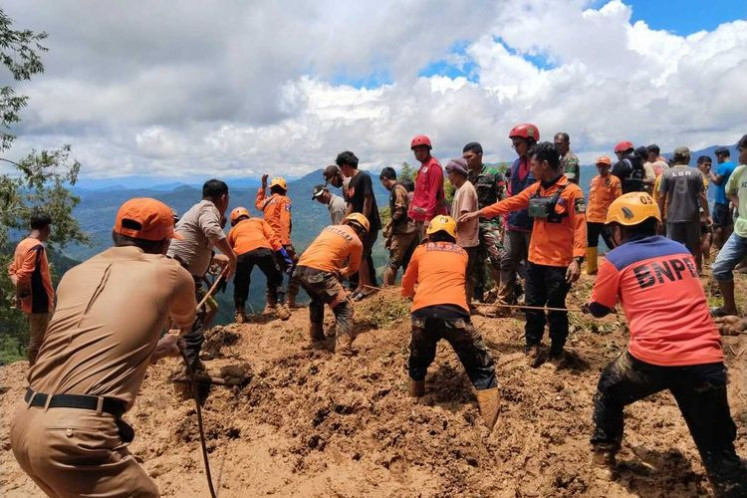Big cigar keeps environment clean
From Lampung with dung: A worker hoses cow dung at Santori company cattle farm company in Bumi Aji, Anaktuha subdistrict, Central Lampung
Change Size

F
span class="inline inline-center">From Lampung with dung: A worker hoses cow dung at Santori company cattle farm company in Bumi Aji, Anaktuha subdistrict, Central Lampung. The dung liquid will flow into a pond that will then be processed into biogas.
Seen from a distance, the giant septic tank installation made from High Density Polyethylene (HDPE), resembles a giant balloon that has been planted in the earth.
The blue installation is located among cattle feedlots owned by PT Santosa Agrindo (Santori) in Bumiaji Kampung, Anaktuha subdistrict, Central Lampung Regency.
The septic tank, which measures 90 by 45 meters with a depth of nine meters, holds cow dung, a dung-processing machine and a filter pool for cow dung.
There is enough bacteria inside the tank to break down the cow manure into solids and liquids, reducing the quantity of methane gas that would normally be released into the air. The installation is called a Covered In-Ground Anaerobic Reactor (CIGAR) or biogas plant, and is owned by PT Santori.

The cigar stands in a complex of feedlots fattening 22,000 heads of cattle from Australia. The cow dung processed inside the cigar reduces the impact of greenhouse gas emissions on the environment.
“This cigar forms part of our commitment to help governments reduce greenhouse gas emissions.
With this cigar, we are helping reduce greenhouse gas emissions equal to 200,000 tons of carbon dioxide within a period of 10 years,” said the president director of PT Santori, Samuel Wibisono.
Two hundred tons of carbon dioxide is the equivalent of carbon emissions released by 35,000 cars.
The cow dung, which is processed by the cigar owned by PT Santori, produces an average of 900 tons of methane gas per year. The methane is then processed to produce renewable energy equal to one megawatt.
PT Santori uses the methane gas to make electricity for later use.
“We are collaborating with the state electricity company [PLN] so that the people who live around the company premises can also take advantage of the biogas we produce. So far, we are just burning the methane gas so it doesn’t escape into the environment,” Wibisono said.
Using cow dung to create a renewable energy resource is not a new practice, says Wibisono. Many dairy farmers in Indonesia currently process cow dung to produce energy used for everyday purposes.
“But so far we are the only ones who have developed a processing plant on a large scale that can use dung from 22,000 heads of cattle.”
And until now, PT Santori is the only renewable energy producer registered and recognized by the United Nations Framework Convention on Climate Change [UNFCCC], in the category of cattle feedlot animal waste management improvement systems, he adds.
Spokerperson for PT Santori Dayan Antoni says that if large quantities of cow dung weren’t processed, the methane gas resulting from the cow dung would be directly released into the atmosphere and affect the environment.
“Twenty cows can produce 160,000 kilograms of waste. That cattle waste is then channeled through a pipe, into 14 small ponds, and then processed into biogas inside the cigar, or digester,” Antoni says, adding that the biogas will eventually be used to create electricity by 2011.
However, the plant will not be fully operational until later in 2011.

“Our feedlot at Bekri can accommodate 22,000 heads of cattle, while the feedlot in Jabung, East Lampung, has a capacity of 16,000 heads of cattle. If the waste is processed to become biogas, it will make a valuable contribution to reducing the impact of greenhouse gases,” says Antoni.
Arrie Setiawan, a project manager for Eco Securities — the company that founded and manages the cigar-owned PT Santori — sayas processing cow manure to make biogas is actually quite a simple process.
“The process is only made more complex because the number of cattle owned by PT Santori,” Setiawan said.
Once manure has been collected from each cattle yard, it is then pumped through a pipe leading to a large sand trap. In the sand trap, solids included in the cow dung are separated out so that only the liquid waste goes into the digester, or giant septic tank.
“The cow waste must go through the sand so that only water is left. Cow manure contains many organic materials, which are digested by the bacteria, creating biogas. This fermentation takes place inside the digester,’’ Arrie said.
Setiawan says the CIGAR owned by PT Santori has the capacity to handle a 250 to 300 cubic meters
an hour.
“This digester is like a septic tank which regulates the release of the methane gas.”
After the biogas has been collected in the digester, employees measure the biogas in the blower and thrust it into the incinerator or flare.
‘’That way, the methane gas doesn’t escape directly into the atmosphere,” he said.
When the cigar was inaugurated early last December, the chief of the National Council on Climate Change (DNPI), Rachmat Witoelar, praised the efforts being made to reduce the impact of greenhouse gas emissions.
“This is a great example highlighting our efforts to reduce greenhouse gas emissions. The operation of the cigar plant to process cow manure into biogas shows that we are very serious in Indonesia about reducing greenhouse gas emissions.
“Indonesia hopes that developed countries, including multinational corporations, can assist with the funds needed to help install similar energy generators,” Witoelar added.
— Photos by Oyos Saroso H.N.









